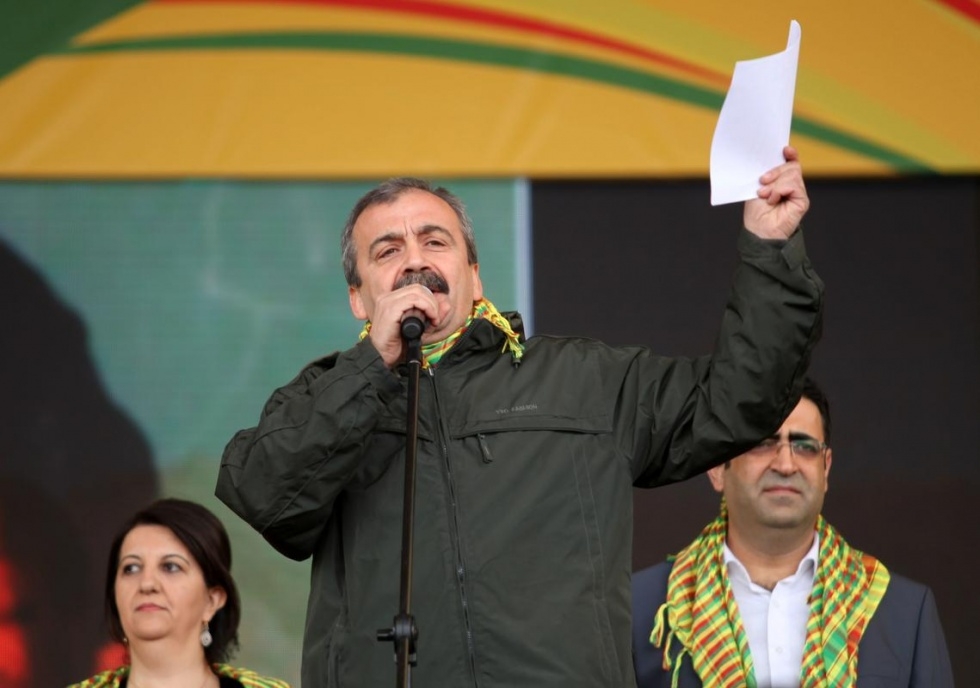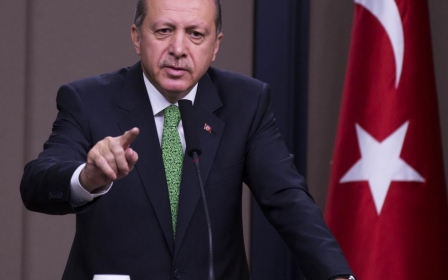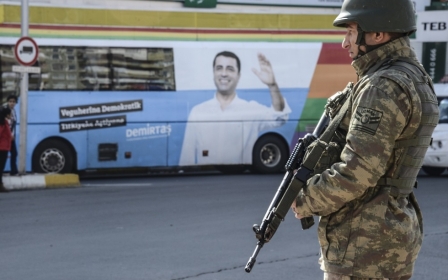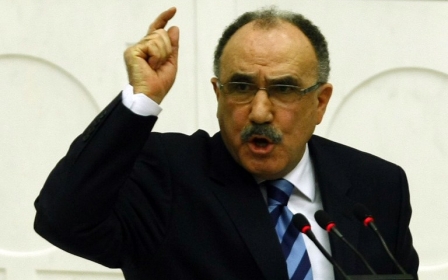Ocalan stops short of disarming PKK

ISTANBUL - The jailed leader of the Kurdistan Workers' Party (PKK) Abdullah Ocalan on Saturday called on the outlawed group to convene an “extraordinary congress” to end its four-decade-long armed struggle against the Turkish state.
However Ocalan stopped short of calling for the full disarmament of the PKK, a move Turkey's government had hoped and expected.
In an address delivered on behalf of Ocalan in the majority Kurdish city of Diyarbakir where thousands gathered for the celebration of Nevruz, the PKK head emphasised that a “democratic solution” was the only way to settle Turkey's Kurdish problem.
It was in his Newroz address two years ago in 2013 that Ocalan first issued a call for the PKK to declare a ceasefire, opening the way for further peace talks with the Turkish government.
Ocalan, who has been imprisoned on the island of Imrali since his capture and arrest by Turkish special forces in Kenya in 1999, called for a new era for Kurds and criticised "meaningless and merciless identity wars" that he said were the result of "a neoliberal crisis caused by imperialist capitalism and its local collaborators."
“The hope from the government was that Ocalan would call for disarmament and that this would be a major step in the peace process, and he didn't do any of that,” said Howard Eissenstat, a Turkey specialist and associate professor of Middle East History at St. Lawrence University, New York.
“Actually Ocalan's statement was pretty boilerplate and the only actionable part was the congress call,” Eissenstat told MEE.
Although he stressed that it's very hard to determine how coordinated Ocalan and the Kurdish political party the HDP are, Eissenstat added that it was possible the lack of a call for disarmament was linked to recent rhetoric from President Recep Tayyib Erdogan on the Kurdish issue.
At a rally in Balikesir last Sunday, Erdogan said there was “no Kurdish question” in Turkey. “My brothers, there has never been any problem called the Kurdish issue in this country,” he told supporters.
The next day HDP co-leader Selahattin Demirtas responded by criticising the speech as a “political manoeuvre”.
“I think Ocalan realises that he can't give away something like disarmament for nothing,” Eissenstat said. “In the end laying down the arms would be a major step for the Kurds and would require something big in return – they haven't received anything big yet.”
Rallies were held across Turkey for Newroz with two HDP officials reading Ocalan's speech in Diyarbakir in both Kurdish and Turkish.
In Istanbul the ruling AKP rally saw Erdogan release a “peace statement” to mark the celebration. The MHP also held a rally in the capital city Ankara.
'We will not make you President'
Ocalan's Newroz speech iterated calls for the Kurdish people to be able to live lives of “free, egalitarian, constitutional citizenship within the Republic of Turkey.”
However the Kurdish movement recognises that if it is to be governed by the Turkish state it will want to exert all the pressure on the central government that it can. Last week Demirtas attacked Erdogan in a parliamentary group session, addressing the president directly.
“If there is no Kurdish question, why is the peace process still continuing,” Demirtas said on 16 March.
“You will never be able to be the head of the nation as long as the HDP exists and as long as the HDP people are on this soil,” Demirtas said, eliciting a popular social media hashtag of #SeniBaşkanYaptırmayacağız (We will not make you president).
AKP Prime Minister Ahmet Davutoglu responded criticising Demirtas's speech as “disrespectful to democracy”.
“It is the Turkish people who will decide whether our president becomes the head of the nation,” Davutoglu said on 17 March.
AKP split
Shortly after Ocalan's address, Turkey's Deputy Prime Minister Bulent Arinc put out a statement clarifying that the government does support the establishment of an independent council to monitor the Kurdish peace process.
This statement ran counter to comments made by President Erdogan on 20 March in which he expressed opposition to the idea of a monitoring council, claiming Turkey's intelligence service should lead the peace process.
Deputy Prime Minister Arinc responded to this disparity, saying President Erdogan “should not make public statements on disagreements with the government.”
Arinc's comments marked the second time this month that he has publicly criticised President Erdogan. On 6 March, he also made a statement against Erdogan's public criticism of Central Bank governor Erdem Basci and second Deputy Prime Minister Ali Babacan.
“I think that this is an interesting dynamic,” said Eissenstat, “there is fracturing in the Kurdish movement, but also in AKP.”
“It's been quite clear for three months that central figures in AKP are starting to see President Erdogan as a policy liability and hope that they could reign him in somehow,” he told MEE.
“What we're seeing are ongoing tiffs between the government and Erdogan that sort of throws a wrench in the works of a peace deal.”
Bulent Arinc's comments strongly outlined a split between the presidency and Prime Minister's office.
“We have a road map on who’s going to do what throughout the process. It’s the government that is running the country and the responsibility belongs to the government,” Arinc said.
He went on to say that statements made by Prime Minister Ahmet Davutoglu and deputy Prime Minister Yalcın Akdogan took primacy on the question of the Kurdish peace process.
Real steps needed
According to Cale Salih, a visiting fellow at the European Council on Foreign Relations who researches Kurdish matters, Ocalan's decision to withhold from a full disarmament call means the government will have to take “some real steps” towards meeting Kurdish demands.
“Ocalan cannot call on the PKK to lay down its weapons tomorrow while so many Kurds still feel that the government has not made progress,” Salih, who was speaking from Diyarbakir, told MEE.
“On Kurdish demands, especially mother language education, the government also needs to start thinking seriously about a transitional justice programme that would allow these people to disarm and demobilise.”
Salih also added that Newroz celebrations across south-east Turkey this year focused heavily on violence against Kurds in Kobane and Rojava in Syria.
“Ultimately Turkey will need to find a way to make peace with the PKK outside of Turkey, in particular the PYD/YPG in Syria,” she told MEE, “because even if the PKK decides on ending the military campaign inside Turkey it will live on as an armed movement in Syria and Iraq.”
New MEE newsletter: Jerusalem Dispatch
Sign up to get the latest insights and analysis on Israel-Palestine, alongside Turkey Unpacked and other MEE newsletters
Middle East Eye delivers independent and unrivalled coverage and analysis of the Middle East, North Africa and beyond. To learn more about republishing this content and the associated fees, please fill out this form. More about MEE can be found here.




